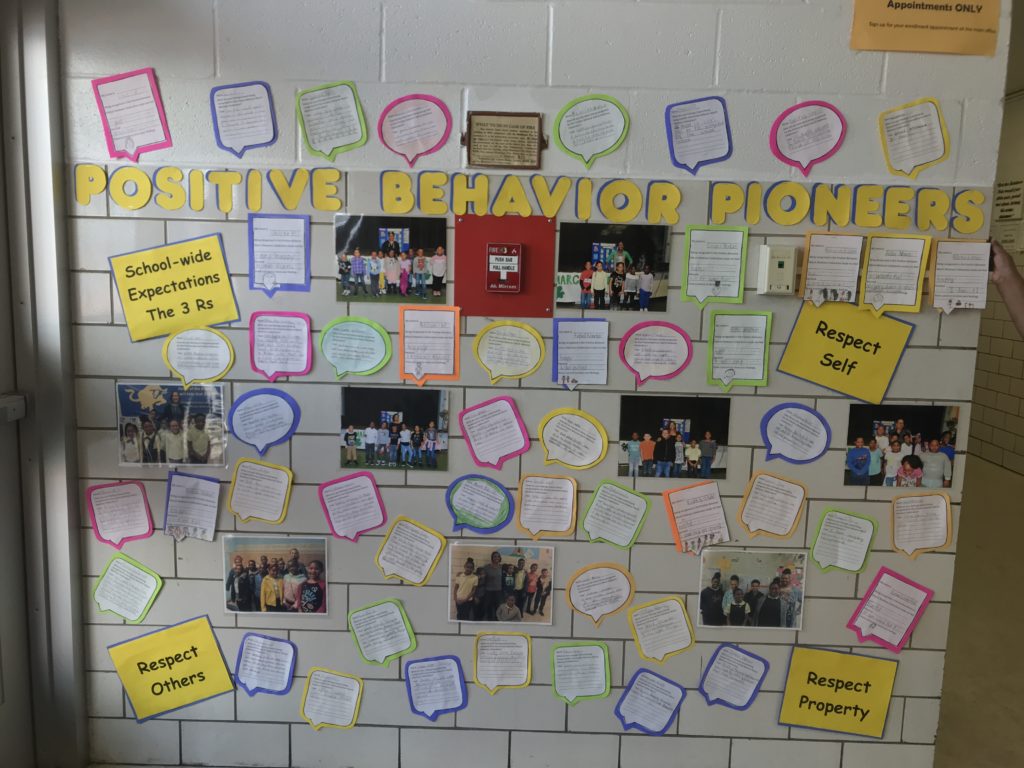Practice Shift: Rewarding Positive Behavior
By Dawn Foreman, Program Director
Teachers and staff at Houston Elementary School used to spend a lot of time correcting students when they misbehaved. While they were reacting to inappropriate behavior rather than proactively acknowledging positive behavior, they saw historically well-behaved students acting out to get their share of adult attention. When many teachers noticed this pattern, they decided to develop a schoolwide strategy that focused on positive behavior.
With Turnaround’s help, the school formed a Culture and Climate Committee. The committee, chaired by second-grade teachers, Tracey Thomas and Twanda Hooker, includes kindergarten teachers, Estefania Millstein and Jamillah Williams; first-grade teachers, Stephanye Ashford and Sabrina Malone; fourth-grade teachers, Candice Crump and Tawanjia Johnson; physical education teacher, Clifford Alexander; and behavior technician, Jamal Hulum. Their challenge? Design a system to incentivize and celebrate positive behaviors.

Pictured left to right: Stephanye Ashford, Jamillah Williams, Estefania Millstein, Tracey Thomas, Tawanjia Johnson, Candice Crump, Twanda Hooker and Sabrina Malone
The committee generated a list of ways that positive student behavior could be recognized and then chose monthly incentives, beginning in March. To participate, students had to demonstrate positive behavior 80% of the time. The incentive program launched in February, first to staff, then students in March. The March Madness Positive Behavior Dance rewarded students who demonstrated behavior that aligned with schoolwide expectations 80% of the time. Approximately 46% of the student body (90 students), ranging from kindergarten to fifth grade, qualified to participate.

Pictured left to right: Turnaround for Children staff, Matthew Vialva, Joscelyn Reed, and Dawn Foreman and Houston Behavior Tech, Jamal Hulum
When asked, some students in grades K-1 said, “Being recognized in the March Madness celebration made them feel: “… excited because I can stay on green!” and “…very happy because it was fun!”
Some student in grades 2-5 said they felt:
- “Happy because I was noticed for respecting others, self, and property.”
- “Happy that I made it! I liked that we could dance and eat treats. Can’t wait for the next one.”
- “Thankful and excited because people recognized my good behavior.”
- “Proud that I have positive behavior, and I will always keep it up.”
- “Great about going to the celebration. I am proud of myself, and it was so fun! I was dancing and eating. It was awesome!”

The Positive Behavior Wall includes photos of the students who attended the March event and the quotes students wrote about how they felt about being recognized for positive behavior.
To build motivation and excitement around the next event, the Culture and Climate Committee presented a slide show at the April 6 schoolwide meeting so that students who had not earned the right to participate in March were able to see what fun was in store. The hope was more students would be motivated to make positive choices and earn attendance at future events.
The second positive behavior incentive was called, April Showers of Positive Behavior Spring Olympics. Students had a great time playing a variety of games facilitated by Mr. Alexander, the Health and Physical Education teacher. Approximately 55% of students in grades K-5 qualified to participate. Those who went shared how they felt about the event at the school-wide Town Hall Meeting on May 4. The final celebration for this school year will be held in June and will be called the Bicycle Rodeo and Popsicle Positive Behavior Party.
When asked why they decided to head the Culture and Climate committee, Ms. Thomas and Ms. Hooker both responded, “Our school needed consistency in behavior management and a consistent and effective way to recognize positive behavior. Having a committee that focuses on culture and climate has been of great value to our school.”
While the positive behavior incentives have not fixed all negative student behavior and teacher practice, teachers at Houston are beginning to put more focus on reacting to positive student behavior rather than reprimanding the negative. As Houston Elementary School moves into next year, the Culture and Climate Team’s hope is that teachers will continue to use the schoolwide expectations – Respect Self, Respect Others, Respect Property – when speaking with students about their behaviors. The group is in the process of planning for next year so that the positive behavior recognition can continue to flourish.

Share This Story